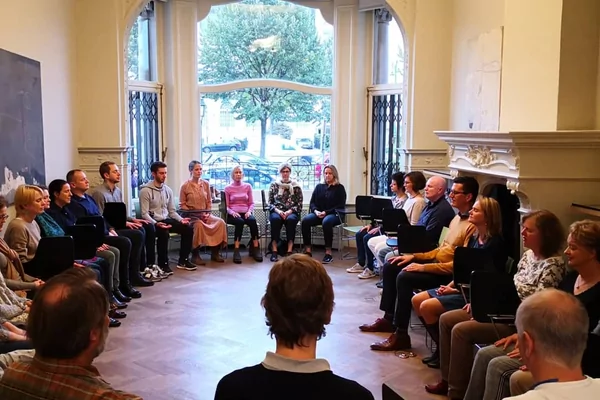The other night, I noticed how my mind spun out of control. I woke up at 3 a.m., worrying about something that might go wrong in the future. My heart was racing, my body tense, as if danger was right there in the room. Yet when I looked around, everything was calm.
Has this happened to you?
Fear has a vital role: it protects us from real risks. But so often, our minds raise false alarms. We end up carrying unnecessary fears and worries that weigh us down and stop us from enjoying life fully.
Real threat or false alarm?
Our brain is like a smoke detector — quick to sense danger, but sometimes oversensitive. It can go off when there’s no real fire.
When fear arises, I try to pause and ask myself:
Is this an actual, immediate threat? Or is it my mind imagining worst-case scenarios?
This little check already shifts something. Naming it helps me see: “Ah, this is just a false alarm.”
The key is to find a healthy balance—neither underestimating real dangers nor overreacting to minor worries. This is where mindfulness plays a crucial role. It helps us discern what is truly a problem and when it is just our mind giving a false alarm.
Strategies for letting go of unnecessary fear
So, what can you do to loosen the grip of needless worry? Here are some insights from my own mindfulness practice over the years:
1. Recognise false alarms
Mindfulness helps us become less reactive. By pausing and taking a few breaths, we can step back and observe our thoughts, noticing whether we are responding to a real threat or an imagined one.
Here is a guided STOP practice to help you see more clearly.
2. Question your thoughts
Worrying is the mind’s attempt to “fix” an emotional problem by thinking it through. But overthinking often makes anxiety worse. When I realised that thoughts are just thoughts—not necessarily facts—I was able to stop believing every worry my mind generated.
To put things in perspective, try asking yourself:
- How likely is this to happen?
- What’s the worst-case scenario?
- How would I cope? What resources could I draw upon?
- What would I tell a friend who is having this worry?
Not every thought deserves your full attention — when I stopped believing every worry my mind created, I found more peace.
3. Soothe your body
Anxiety doesn’t just affect our minds; it often shows up in our bodies as well. Self-compassion techniques, such as soothing touch (placing a hand on your heart or belly) or the body scan meditation, can help you reconnect with your body and release tension.
Here are a guided boydscan practice and a soothing touch practice to try this out.
4. Take in moments of peace and ease
While anxiety primes the brain to focus on threats, we can actively train ourselves to notice and absorb positive experiences. Notice moments of ease, safety, or well-being—even small ones. Deepen and intensify this sense of calm so it can become part of your inner resources.
This process of positive neuroplasticity rewires the brain for resilience. As neuroscientist Rick Hanson says, “Neurons that fire together, wire together.” If we repeatedly absorb moments of calm and safety, we strengthen our ability to feel at ease, even in difficult times.
Here is a practice on cultivating inner calm, joy and love.
5. Ask yourself: What is within my reach?
The world can feel overwhelming, and we cannot control everything. But we can focus on what is within our reach. What small actions can you take—whether for yourself or others—to bring more kindness, connection, or stability into your life? Sometimes, even small mindful actions—like taking a break or connecting with a friend in need—can create a positive shift.
6. Seek professional support if needed
If your anxiety or panic attacks feel overwhelming, seeking professional support can provide tailored guidance and relief. A skilled therapist or coach can help you develop strategies to cope more effectively.
Learning from autumn trees
Letting go of unnecessary fear is not about denying danger or pretending everything is fine. It’s about noticing when the mind sounds false alarms and learning to release them. In doing so, we free up energy for what truly matters.
Walking past the autumn trees, I am reminded of their wisdom. They don’t cling to their leaves once the season has passed. They let them fall, creating space for rest and renewal.
We too can learn this art of release. The next time fear arises, pause for a breath and ask yourself: Is this a real threat — or can I allow it to fall away?
These small acts of letting go, practised again and again, gradually bring more clarity, trust, and ease into our lives.
Check out this guided meditation on "the sacrament of letting go".







